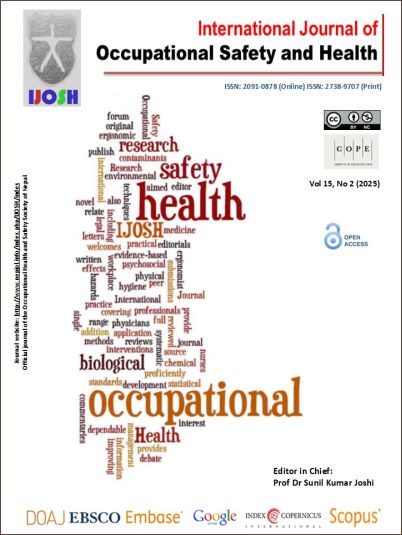Livelihood impacts of job-related illnesses among informal waste workers in Kathmandu Metropolitan City, Nepal
DOI:
https://doi.org/10.3126/ijosh.v15i2.66126Keywords:
Illness, Informal waste workers, Job-related illnesses, Kathmandu, Occupational hazards, Solid waste managementAbstract
Introduction: Informal Waste Workers (IWWs) face numerous occupational hazards, including exposure to toxic materials and a lack of safety measures, which can lead to various health issues. This study investigates the prevalence of job-related illnesses among IWWs in Kathmandu Metropolitan City (KMC) and identifies the most common types of illnesses experienced.
Methods: A mixed-method cross-sectional study was performed. The primary data were collected via a survey of 100 IWWs using snowball sampling from November 2022 to January 2023, covering Itinerant Waste Buyers (IWBs), landfill workers, rag pickers, and scrap center workers. Interviews with key informants, including the head of the Solid Waste Management Association of Nepal (SWMAN), Samyukta Safai Jagaran (SASAJA), and waste collection service providers, were conducted. The data was analyzed using SPSS and ALTAS.ti software.
Results: Health issues are prevalent, with 49% of respondents reporting illness in the past year, 69% of which were job-related. Common ailments include headaches, body aches, and fevers. Workers often avoid health checkups due to cost, relying on self-medication. Only 15% received medical benefits from employers, and Personal Protective Equipment (PPE) usage was inconsistent, with many reusing gloves found in waste. There was no significant correlation between gender, nationality, and type of waste worker with the likelihood of becoming unwell.
Conclusion: IWWs in KMC face numerous job-related health issues which impact their ability to work. Safety concerns, such as lack of proper medical care and inadequate use of PPE, increase their vulnerability.
Downloads
Downloads
Published
How to Cite
Issue
Section
License
Copyright (c) 2025 The Author(s)

This work is licensed under a Creative Commons Attribution-NonCommercial 4.0 International License.
This license enables reusers to distribute, remix, adapt, and build upon the material in any medium or format for noncommercial purposes only, and only so long as attribution is given to the creator.





